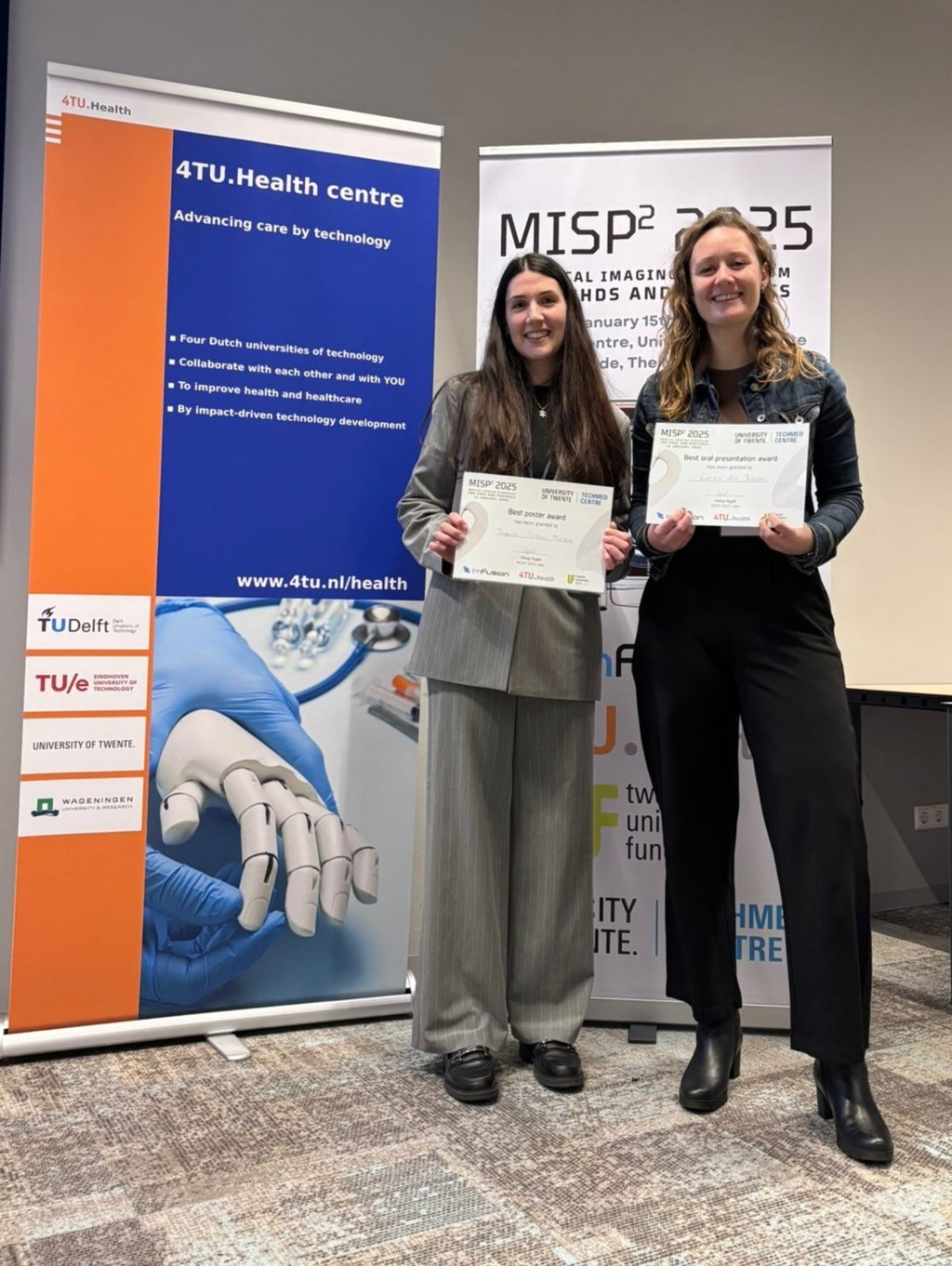Professionalism, collegiality and solidarity were at the forefront during the Medical Imaging Symposium on Wednesday 15 January at the University of Twente. This annual event, organised for and by PhD candidates and postdoctoral researchers from universities and university medical centres, offered a varied programme with plenty of opportunities to share current knowledge, exchange experiences and network.
Two academic keynote speakers were central to the program. Daniël Cox, Researcher at the University of Twente gave an interesting presentation on model-based wavefront shaping, which enables sharp focus in microscopic images by compensating for scattering using a computer model. In the afternoon, Marijn Stollenga, Senior research scientist at ImFusion, a company specialized in developing advanced software solutions for medical imaging, computer vision, and robotics, explained how research ideas can be translated into concrete applications. Next to this, current research in the field of medical imaging was presented, there were poster presentations, and ample opportunities for networking.
Added value of medical imaging
Medical imaging is essential in modern medicine and continues to develop rapidly. Techniques such as CT, MRI, PET, X-rays, and ultrasound are increasingly used for both diagnostics and treatments. Innovations in imaging and image analysis make it possible to visualize the body not only before or after a procedure but also during the process. This increases effectiveness, reduces the impact on the patient and can lead to cost savings. The appropriate use of imaging, tailored to healthcare needs, contributes to more efficient and targeted care.
During the day, the latest developments in medical imaging were discussed, such as AI-driven detection, implant alignment, AI algorithms for diagnoses, and the detection and quantification of cells. The creation and use of large-scale datasets and segmentation of medical images were also covered. These innovations have the potential to ensure faster and more accurate diagnoses and treatments.
Collaboration between science and practice
Medical imaging plays an important role in patient care in hospitals, and is a focus of research in academic and STZ hospitals and universities. Where research into medical imaging, ranges from optimizing imaging techniques and applying AI for image analysis to training healthcare staff and planning medical imaging.
Jelmer Wolterink, Associate professor at the University of Twente: ‘The great thing about this symposium was that it was held at a technical university. This offered researchers and academic medical centers a glimpse into the innovations taking place there, and how academic research at the four technical universities can be translated into healthcare applications.’ The symposium thus brought together healthcare, business, and science to promote knowledge sharing and collaboration.
Impact on healthcare
Medical imaging improves healthcare by providing rapid and accurate diagnoses, leading to better treatments and higher patient satisfaction. Early detection of diseases, such as cancer, enables targeted therapies and increases the chances of successful treatments.
Additionally, medical imaging – when properly implemented – helps with cost savings through quick diagnoses, shorter hospital stays, and fewer unnecessary tests. This leads to more efficient use of resources and reduces the costs of expensive treatments.
Recognition for young researchers
The symposium offered young researchers the opportunity to present their work, both through pitches and posters. Attendees chose the winners for the 'Best presentation' and 'Best poster' in a collegial atmosphere focused on knowledge sharing.
The award for Best presentation went to Linda ten Klooster from the University of Twente for her research on the use of AI to determine the ideal position for knee prostheses. Her fellow attendees praised her strong communication skills. The Best poster award was won by Carmen Maruccio from Nederlands Kanker Instituut for her research on determining the uncertainty of AI models in the radiotherapy treatment of patients with rectal cancer. Her visually impactful poster attracted the attention of many visitors.

All about medical imaging
This successful symposium gave attendees with a contemporary overview of the latest developments in AI, machine learning, and medical imaging. Promising technologies aimed at improving healthcare were presented. Additionally, the symposium offered a valuable platform for new talent to share knowledge and build a network.
The symposium was preceded by a year of preparation by a dedicated team of eight PhD students and Postdoctoral researchers from the University of Twente, all working in the field of medical imaging. It is clear that young researchers make an indispensable contribution by developing new techniques for imaging and image analysis, with an impact on the healthcare of tomorrow.
Details about the full programme of the Medical Imaging Symposium can be found on the website of the event.